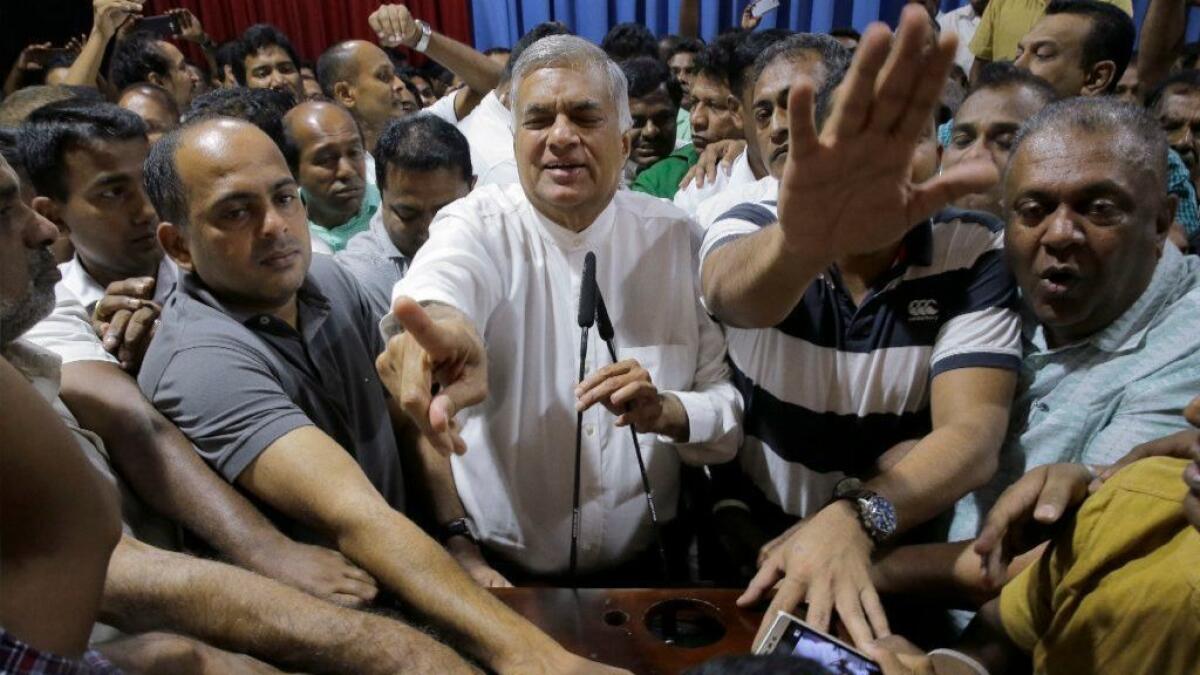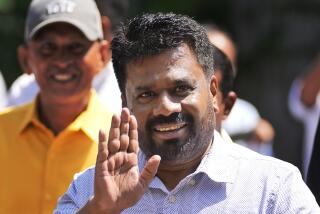Political crisis grips Sri Lanka as former strongman appears to return to power
- Share via
Reporting from Colombo, Sri Lanka — Sri Lanka slid deeper into political crisis on Saturday when the president suspended Parliament to block a vote on his surprise decision to fire the prime minister and install the country’s former strongman in his place.
The ex-leader, Mahinda Rajapaksa, took the prime ministerial oath of office Friday night in a ceremony broadcast on a television station loyal to his powerful family.
His supporters said they would appoint a Cabinet on Monday even as the fired prime minister, Ranil Wickremesinghe, described the move as a constitutional coup and refused to step down, insisting he had the support of a parliamentary majority.
“Let Parliament decide who should be the prime minister,” Wickremesinghe told a news conference on Saturday, surrounded by allies at his official residence.
At the same time, the president, Maithripala Sirisena, issued an order suspending Parliament until Nov. 16. The move appeared designed to give Rajapaksa time to build political support.
“It suggests that they might feel they don’t have the numbers,” said Paikiasothy Saravanamuttu, executive director of the Center for Policy Alternatives, a Colombo think tank. “But [Rajapaksa] has support with the security forces and law enforcement, and they will try to work on the rest.”
Sri Lankan media published a photo of a senior police official saluting Rajapaksa in his office, sending a message that the ex-president had the state’s force on his side.
The dramatic shake-up plunged the island nation into its gravest constitutional crisis in 70 years of independence and capped a period of intense political dysfunction following Rajapaksa’s defeat in a 2015 presidential election that was then hailed as a triumph of democracy.
Wickremesinghe met later Saturday with diplomats from the United States and other countries at Temple Trees, his official residence in the heart of Colombo. He showed no sign of bowing to a threat by Wimal Weerawansa, a lawmaker and top Rajapaksa ally, that if he didn’t vacate the residence by 8 a.m. Sunday, Rajapaksa’s supporters would “take action.”

Rajapaksa amassed power and loyalty from Sri Lanka’s ethnic Sinhalese Buddhist majority during his decade as president. Casting himself as a military hero, he brought a decisive but brutal end to a long civil war with minority Tamil rebels while shrugging off allegations of war crimes and the enforced disappearances of opponents.
But he was widely accused of corruption and of embracing high-interest Chinese loans for pet projects that critics said plunged the country of 20 million into unsustainable debt.
He was defeated at the polls by Sirisena, a former ally, who took the helm of a coalition government. But Sirisena quickly clashed with Wickremesinghe, and their government has become deeply unpopular for failing to fulfill most of its pledges to investigate graft and wartime abuses.
In recent months their relationship has ruptured openly with each man publicly undermining the other.
The last straw, observers said, appeared to be a statement issued by Wickremesinghe last week following a visit with Indian Prime Minister Narendra Modi. According to a report in the Hindu, an Indian newspaper, Sirisena had been angered when Wickremesinghe reported that Modi was dissatisfied with the progress of Indian investment projects in Sri Lanka.
Sri Lanka has become an arena of intensifying competition between neighbor India and China, which has sought to expand its influence in southern Asia by doling out loans and infrastructure.
The U.S. State Department called on Sri Lankans to “refrain from violence, and follow due process.”
Rajapaksa’s defeat in 2015 was widely seen as a setback for China, and the new government immediately launched a review of Beijing’s investments on the island. But Sri Lanka didn’t cancel any projects, which were bound by debt and contractual obligations, and last year handed China control of a giant port on its southern coast, a strategic location along key shipping lanes in the Indian Ocean.
While the 99-year lease on the port in Hambantota, Rajapaksa’s hometown, prevents its use for military purposes, the move alarmed India.
“There isn’t a lot that China has wanted in Sri Lanka that it hasn’t gotten even under this government,” said Alan Keenan, an analyst with the International Crisis Group.
“But if Rajapaksa comes back into power, China and its money, political leadership, ideas and influence will be more enthusiastically received again.”
Rajapaksa, who tweeted a photo of his swearing in on Friday, did not issue any public statements. His allies said Sri Lanka’s constitution gives the president the power to appoint a prime minister he believes would command parliamentary support.
“I don’t think we should even step out to defend this as his swearing in was within the constitution,” Keheliya Rambukwella, a lawmaker from Rajapaksa’s party, said in an interview.
Rajapaksa plotted his comeback from the moment he lost reelection, and earlier this year his party won a landslide victory in local elections as voters expressed their dissatisfaction with the fractious Sirisena-led government.
Following that vote, Wickremesinghe handily defeated a parliamentary no-confidence vote in April. But most observers believed that Sirisena was looking for an opportunity to fire Wickremesinghe and restore his alliance with Rajapaksa before presidential elections next year.
The shake-up came as newly established anti-corruption courts begin hearing cases stemming from the Rajapaksa era. Although the courts were steering clear of the most explosive allegations, one case involved Rajapaksa’s brother, Gotabaya, the former defense secretary, who was accused of misappropriating nearly $300,000 in state funds to build a museum.
Rajapaksa’s return to power all but assures that those cases will be quashed, Keenan said.
“That might have been one reason why the Rajapaksas wanted to strike as soon as possible — they may well have been worried that they might actually get zapped by one of these cases,” Keenan said.
“That’s one of the most disappointing aspects of this, which is that these cases probably won’t proceed anymore … and the government would have lost a historic opportunity to begin to put a check on the culture of impunity that has plagued Sri Lanka for many years.”
Special correspondent Mushtaq reported from Colombo and Times staff writer Bengali from Mumbai, India.
Shashank Bengali is South Asia correspondent for The Times. Follow him on Twitter at @SBengali
More to Read
Sign up for Essential California
The most important California stories and recommendations in your inbox every morning.
You may occasionally receive promotional content from the Los Angeles Times.











